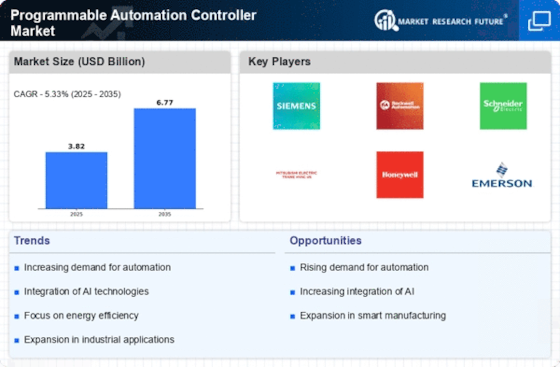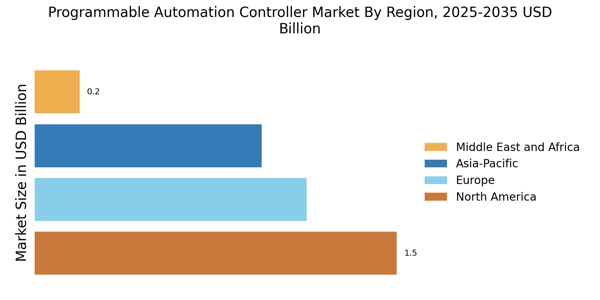Growing Emphasis on Industry 4.0
The growing emphasis on Industry 4.0 is a significant driver for the Programmable Automation Controller Market. As industries transition towards smart manufacturing, the need for interconnected systems and real-time data exchange becomes paramount. Programmable automation controllers play a crucial role in facilitating this transition by enabling seamless communication between machines and systems. The market is witnessing an increasing integration of IoT devices, which enhances the functionality of these controllers. Industry 4.0 initiatives are projected to contribute to a substantial increase in market size, with estimates suggesting a potential market value exceeding USD 10 billion by 2027. This shift towards smart factories underscores the importance of programmable automation controllers in achieving operational efficiency and flexibility, thereby driving growth in the Programmable Automation Controller Market.
Rising Demand for Automation Solutions
The increasing demand for automation solutions across various industries is a primary driver for the Programmable Automation Controller Market. As manufacturers seek to enhance productivity and reduce operational costs, the adoption of programmable automation controllers has surged. According to recent data, the market is projected to grow at a compound annual growth rate of approximately 8% over the next five years. This growth is fueled by the need for real-time monitoring and control in manufacturing processes, which programmable automation controllers facilitate. Industries such as automotive, food and beverage, and pharmaceuticals are particularly inclined towards automation, thereby propelling the demand for these controllers. The Programmable Automation Controller Market is thus positioned to benefit significantly from this trend, as companies increasingly recognize the value of automation in achieving operational excellence.
Regulatory Compliance and Safety Standards
Regulatory compliance and safety standards are increasingly shaping the Programmable Automation Controller Market. As industries face stringent regulations regarding safety and environmental impact, the demand for reliable and compliant automation solutions rises. Programmable automation controllers are essential in ensuring that manufacturing processes adhere to these regulations, thereby mitigating risks associated with non-compliance. The market is likely to see a surge in demand for controllers that offer advanced safety features and compliance capabilities. This trend is particularly evident in sectors such as pharmaceuticals and food processing, where adherence to safety standards is critical. Consequently, the Programmable Automation Controller Market is expected to expand as companies prioritize compliance and safety in their automation strategies.
Increased Investment in Smart Manufacturing
Increased investment in smart manufacturing is a pivotal driver for the Programmable Automation Controller Market. As companies recognize the potential of smart technologies to enhance efficiency and reduce costs, there is a marked shift towards automation solutions. Investments in smart manufacturing initiatives are projected to reach unprecedented levels, with estimates indicating a growth trajectory that could surpass USD 15 billion by 2026. Programmable automation controllers are at the forefront of this transformation, enabling manufacturers to implement advanced automation strategies. The integration of these controllers with smart technologies facilitates improved data analytics and operational insights, which are essential for informed decision-making. This trend suggests a robust future for the Programmable Automation Controller Market, as businesses increasingly allocate resources towards smart manufacturing solutions.
Technological Advancements in Control Systems
Technological advancements in control systems are significantly influencing the Programmable Automation Controller Market. Innovations such as enhanced processing power, improved connectivity options, and the integration of artificial intelligence are transforming the capabilities of programmable automation controllers. These advancements enable more sophisticated data analysis and decision-making processes, which are crucial for modern manufacturing environments. For instance, the incorporation of machine learning algorithms allows for predictive maintenance, reducing downtime and increasing efficiency. The market is expected to witness a substantial increase in the adoption of these advanced controllers, as industries strive to leverage cutting-edge technology to optimize their operations. This trend indicates a promising future for the Programmable Automation Controller Market, as companies invest in next-generation control systems to stay competitive.
















